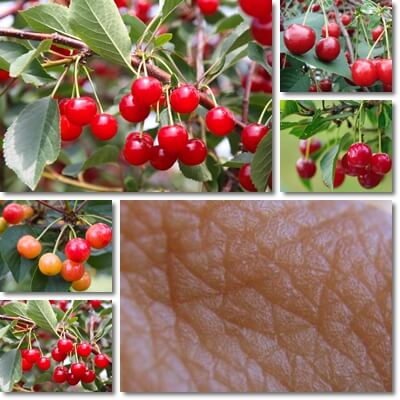Cherries are a good food to eat for young, healthy, beautiful skin. All the different types of cherries hold benefits for skin health, including red cherries, black cherries, white, yellow and red and yellow Rainier cherries. Red and black cherries have anthocyanin antioxidants with anti-inflammatory and antiaging properties. Yellow cherries and Rainier cherries are a source of pro-vitamin A carotenes which support the production of new skin cells. Tart cherries are high in astringent organic acids which help tighten skin, as well as a good source of vitamin C for collagen production.
1- Cherries stimulate collagen production
Cherries in general are a good source of vitamin C. One of the functions of vitamin C is to stimulate the production of collagen in the skin. By stimulating collagen production, vitamin C in cherries contributes to better skin elasticity and helps prevent and delay wrinkles and reduce wrinkles appearance for a more younger looking skin. Not just this, but vitamin C from the diet, whether food or dietary supplements, accumulates in the skin, studies say, where it exerts a photoprotective role and prevents UV damage (source).

How much vitamin C in cherries?
There are about 7 mg (milligrams) of vitamin C in 100 g of sweet cherries and about 10 mg in tart cherries. The average adult needs to get at least 90 mg (milligrams) of vitamin C a day to prevent a deficiency. For measurable benefits, the dose starts at 500 mg (milligrams) of vitamin C per day, studies say, and can easily go up to 1 gram, 2 grams or 3 grams of vitamin C per day, depending on individual tolerance level.
According to research (source), vitamin A in cherries further contributes to collagen synthesis, activating and boosting the production of collagen in the skin which contributes to an improved appearance of fine lines and wrinkles and an antiaging effect. Vitamin A also encourages collagen deposition in the subepidermal dermis layer of the skin for added localized antiaging benefits. Both eating and using cherries for skin care, as in topical use in the form of face masks, can help restore the functions of skin damaged by sunlight exposure and increase collagen production for improved skin elasticity and an anti-wrinkle effect.
2- Cherries help make new skin cells
Yellow cherries, Rainier cherries and tart cherries in general, including red and black cherries, all contain good amounts of carotenoids with vitamin A activity such as beta-carotene and, to a lesser extent, alpha-carotene. Carotenes with vitamin A activity are pigmented antioxidants that get absorbed and then converted into vitamin A in the human body which is then transported to the skin where it performs specific functions and essentially advances skin health.
Vitamin A in cherries, occurring in the form of pro-vitamin A carotenoid antioxidants, regulates the production of new skin cells which translates into regenerative and reparative benefits for the skin. Vitamin A supports the maturation and differentiation of new skin cells into specialized cells that perform various functions within the skin. By regulating skin cell turnover, pro-vitamin A carotenoids from cherries further help prevent and treat skin problems related to poor skin cell renewal such as dryness and poor wound healing.
3- Cherries hold benefits for dry skin
Eating cherries is good for dry skin for a number of reasons. Skin cells get old and need replacing on a regular basis. Carotenoids with vitamin A activity in tart and sweet cherries, yellow cherries and Rainier cherries in particular, regulate the production of new skin cells, encouraging the shedding of old, damaged and dry cells from the surface of the skin. This helps regenerate skin and replace poor-performing skin cells with new and healthy cells.
Cherries are also naturally high in water and eating them helps keep skin hydrated for a healthy, plump and more youthful appearance (dehydrated skin looks tired and older than it really is). Cherry fruit in general also contain a range of B vitamins which contribute to nutritional status, preventing a deficiency and its side effects for skin. B vitamin deficiency causes symptoms such as dry, cracked skin and increased risks of infection.

4- Cherries help you get more clear skin
How are cherries good for clear skin? For one, cherries provide carotenoids with vitamin A activity which help produce new healthy skin cells and essentially regenerate the skin, helping achieve a clear skin, free of imperfections.
Pro-vitamin A carotenoids together with zinc in cherries also support wound healing processes and exert reparative effects, with benefits for acne scars, scars from wounds, spots and other minor skin defects.
Cherries are high in antioxidants such as pigmented anthocyanins, carotenes and xanthophylls, colorless polyphenols and vitamins C and A which prevent and actively help repair damaged skin and restore the functionality of its components which actively contributes to skin health and better looking skin, free of damage and imperfections.
To get benefits such as clear skin, you can use cherries both internally, as food, and externally, for skin care – studies show vitamins and antioxidants such as vitamins A and C get absorbed in the skin when applied topically.
5- Cherries have antiaging effects
One of the biggest reasons why cherries are good for the skin is they exert anti-aging benefits. Pro-vitamin A carotenoids in cherries support skin cell renewal processes for the production of healthy new skin cells, essentially contributing to skin regeneration and reparative benefits.
Both pro-vitamin A carotenoids and vitamin C in cherries actively stimulate the production of collagen in the skin for better skin elasticity and an anti-wrinkle action, helping reduce the appearance of fine lines and wrinkles for a younger looking skin. In damaged skin, the vitamins restore normal skin functions, including functions related to collagen production.
Antioxidants in cherries such as anthocyanins, xanthophylls, carotenes, various polyphenols and antioxidant vitamins act at cell level where they combat, limit and prevent cell damage caused by oxidative stress and its side effects – loose, saggy skin, fine lines, wrinkles, spots and hyperpigmentation or lesions caused by sun exposure and associated cell damage.
6- Using cherries in skin care helps tighten skin
Can you put cherries on your face? Yes, you can. Putting cherries on your face is good for your skin for a number of reasons and one of the best home remedies for tightening skin naturally.
Tart cherries in particular are good for tightening the skin because they are astringent as a result of a high content of organic acids (hence why they taste sour).
When applied topically for a few minutes, crushed tart cherries draw skin together for a visible and almost instant tightening effect. Not just this, but putting cherries on the face helps clear excess sebum, hydrate and illuminate the skin, helping it look refreshed and younger.
7- Cherries are good for dull skin
Cherries can be used topically for skin care and help clear excess oils from the skin and brighten dull looking skin. Cherries are also hydrating, helping plump up the skin, and provide nourishment, contributing to more radiant, luminous and essentially younger looking skin.
8- Eating cherries is good for redness
High blood pressure causes flushing and reddening of the skin of the face and can predispose to damage and imperfections in the form of broken capillaries. Cherries and cherry juice are good sources of potassium and magnesium and almost sodium-free, helping lower blood pressure numbers and combat skin redness and especially face redness. Vitamin C in cherries further helps strengthen capillaries, both from within and from the outside, preventing bleeding from them and associated imperfections.
9- Cherries are great for skin care
Are cherries good for skin care? Absolutely. Applying crushed sweet and sour cherries topically benefits the skin in a number of ways. For one, vitamin C and provitamin A carotenoids as well as other pigmented and non-pigmented antioxidants in cherries get absorbed in the skin and protect it from damage caused by free radicals and associated oxidative stress from within, studies say.
The vitamins and other antioxidants scavenge free radicals and limit damage to cells, as well as initiate reparative processes at cell level by stimulating skin cell regeneration and collagen production. This helps improve skin structure and elasticity, and combats the effects of photoaging in the form of changes or damage to the skin resulting in aging signs such as fine lines, wrinkles, spots, hyperpigmentation, discoloration, lesions etc.
Sweet and especially tart cherries applied on the skin help clear excess sebum as well as exert astringent effects, tightening skin naturally. Topical use also contributes to hydrating skin, makes it look plump and radiant, and combats dullness for an overall more youthful appearance.
Are cherries bad for the skin?
Cherries can be bad for the skin if you are allergic to them. An allergic reaction to cherries can affect the skin and cause symptoms such as localized or generalized itching and redness with welts (urticaria), eczema, skin lesions as a result of scratching, swelling of the eyes, mouth or whole face, among other more serious side effects.
